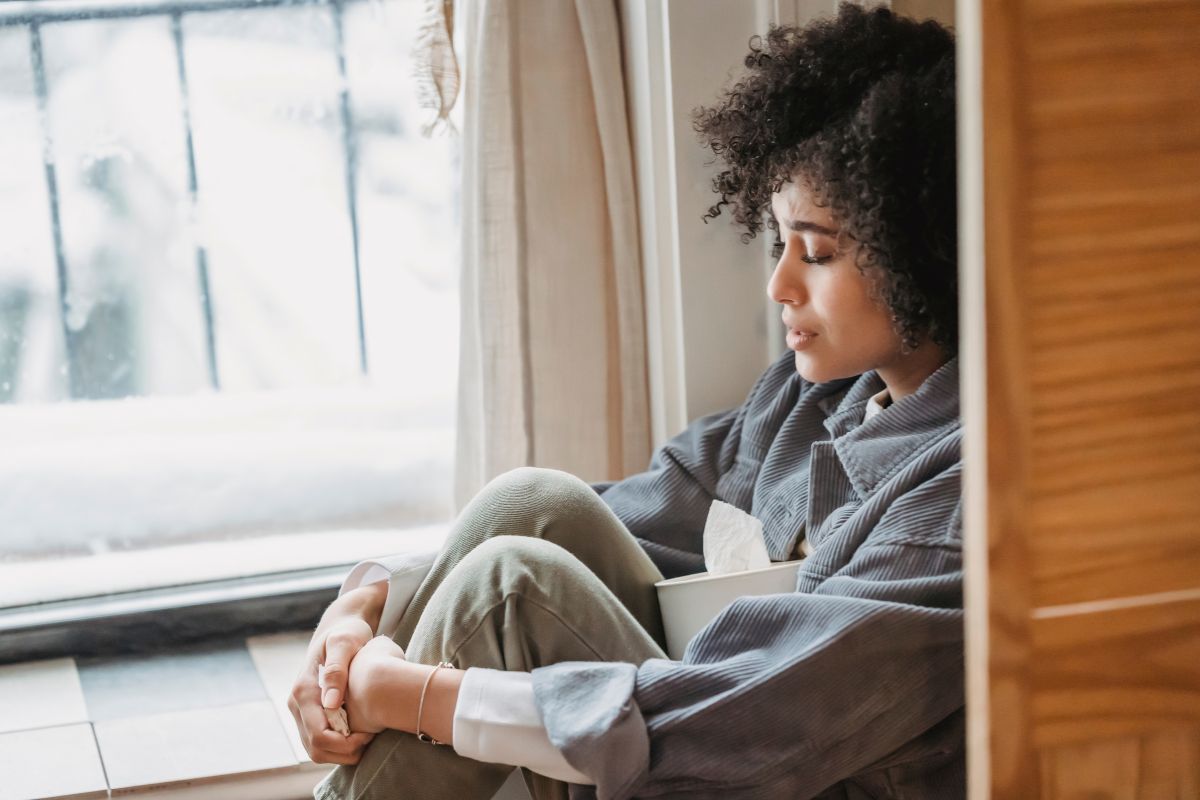
One symptom of an anxiety disorder is feeling as if you’re paralyzed. It may leave you feeling unable to move, speak, or think. One’s arms and legs may feel immobile and heavy. You may struggle to form words. You may have trouble processing what is happening around you.
It is a saddening fact that deserves acknowledgment, awareness, and much-needed discussion. In this article, we’ll discuss everything about paralyzing anxiety: what it is, what causes it, and its impact. We will also have a dedicated section on all the science-based, truthful treatments and interventions for it. Let’s start.
What Is Paralyzing Anxiety?
Anxiety is an automatic response that aids in preparing the body to elicit a reaction to a threat. Paralyzing anxiety is a kind of anxiety disorder. It is a severe form of the body’s automatic response. It is also acknowledged as the “freeze” feature of the fight, flight, and freeze response.
It is similar to “playing dead” in the animal world. In this sense, becoming immobilized helps avoid detection from a predator, unlike the “flight” response. It can also decrease strain on the body, unlike the “fight” response.
Paralyzing anxiety varies from everyday stress or nervousness. It moment freezes the body in response to a detected threat. It doesn’t activate a “get up and go” response to help manage a stressor or daily life presents. It also differs as it impairs functioning in one or more areas of life. It is unique from other anxiety disorders that have a ruled symptom criteria.
What Causes Paralyzing Anxiety?
Paralyzing anxiety is caused by the engagement of biophysical factors with the environment and the synchronous activation of the nervous system’s active and resting parts. It can be precipitated by certain situations or stimuli, such as public speaking, seeing a spider, or leaving the house.
Factors that influence it include an overactive amygdala, a record of traumatic events, negative thinking patterns, family history, and considerable stressors.
Genetics also plays a role. Anxiety disorders occur more often in females than males.
Possible causes of paralyzing anxiety include:
- History of traumatic events
- Overactive sympathetic nervous system
- Social situations
- Phobias
- Taking an exam
Physically Paralyzed With Anxiety
The experience can vary somewhat from one person to the next. Yet the physical symptoms of paralyzing anxiety can be particularly disconcerting.
It can considerably affect your ability to function in general in different facets of your everyday life. You will be unable to perform specific everyday tasks, work-related assignments, and social activities.
It can also cause you to believe something is physically wrong with you. A study ruled that there were an estimated 1,247,000 emergency department visits each year because of anxiety-related symptoms.
Symptoms of physically paralyzing anxiety include:
- Arms: heaviness, one cannot move them
- Legs: inability to walk away and feeling stuck in place
- Speech: trouble finding words, going mute
- Cognition: failure to process incoming information
Emotionally Paralyzed With Anxiety
In addition to the physical sensations anxiety can bring, you may also feel emotionally paralyzed. It can make it challenging to cope with what you’re feeling. It can spoil your relations and other areas of life.
When you are emotionally paralyzed by anxiety, you may abstain from all anxiety-provoking situations. You may limit your life to a significant extent.
An individual with agoraphobia may become homebound. They may never leave the house or need a companion to do so.
A more literal example is severe anxiety that takes over all your other emotions. It limits you to react to either good or bad events that may happen.
Emotionally paralyzing anxiety can also be more subtle. It may cause people around you to perceive you as aloof, inappropriately afraid, or preoccupied.
It can also spoil other areas of your life. It is in social interactions, intimate relationships, or work performance. All can suffer. In some cases, people are so anxious that they abstain from going to their healthcare appointments.
Other Symptoms and Characteristics of Paralyzing Anxiety
When you are anxious, you may exclude several other physical, cognitive, and behavioral symptoms. Some of these include:
- Avoid any situation that may trigger feelings of anxiety
- Decision paralysis
- Social withdrawal and isolation
- Issues with concentrating and thinking clearly
- Muscle tension
- Negative thoughts
- Shaking, trembling and numbness
- Rapid, shallow breathing
- Nausea and upset stomach
- Rapid heart rate
Treatment for Paralyzing Anxiety
1. Cognitive behavioral therapy
CBT can support breaking the relationship between the emotion of anxiety and the particular behavior that is getting in your way. Such as the inability to move or do things because of anxiousness.
It is considered the first-line treatment for anxiety. It is hailed for its effectiveness in treating various anxiety-related disorders. Some examples are panic disorder, social anxiety disorder, generalized anxiety disorder, and post-traumatic stress disorder.
2. Medication
Medications may sometimes be necessary to decrease the severity of anxiety. It can also prevent the recurrence of anxiety attacks.
Benzodiazepines work quickly. This drug is typically employed to relieve anxiety symptoms in the short term. Antidepressants can help people who need long-term intervention but usually take a few weeks to start working.
3. Diaphragmatic breathing
Deep belly breathing interacts with your parasympathetic nervous system.
You may find it helpful to try box breathing. Here’s how to do so:
- Inhale for 4
- Hold for 4
- Exhale for 4
- Hold for 4
It is the most direct tool linked to our nervous system.
4. Grounding exercises
A few grounding exercises can also bring relief. It includes the 5-4-3-2-1 technique.
Here’s how to do so:
- Five things you can see
- Four things you can feel
- Three things you can hear
- Two things you can smell
- One thing you can taste
5. Bilateral stimulation
Tapping exercises may help introduce calm to the nervous system. They engage both sides of your brain, known as bilateral stimulation.
Place your left hand on your right shoulder and right hand to the left. Slowly, alternately tap each hand. Notice the sensations in your body. Practice tapping until you feel more grounded.
6. Mindfulness practices
Such practices can help you stay in the present moment.
Some ideas include:
- Breathwork
- Forest bathing
- Gardening
- Meditation
- Tai chi
7. Physical movement
Wild animals “act away” distressing experiences after being frozen in the fear response. In playing dead.
One may find it helpful to incorporate a similar practice. Physical movement, such as dance, shaking, and yoga, can also address the central nervous system response.

Frequently Asked Questions About Paralyzing Anxiety
1. How do I know if my anxiety is severe?
Ruling the severity of anxiety can be complex. It will depend on how much it’s affecting your day-to-day life and mental health. Still, here are some signs of it:
- Constant worry
- Physical symptoms
- Restlessness or inability to sit still
- Avoidance behavior
- Change in eating habits
- Difficulty concentrating
- Fatigue
2. How do you deal with crippling anxiety?
- Seek professional help
- Medication
- Mindfulness and relaxation techniques
- Regular exercise
- Healthy diet
- Adequate sleep
- Limit caffeine and alcohol
- Support groups
3. Why do I have such bad anxiety?
One possible cause is a buildup of stressful life situations. This may be a significant event or an accumulation of more minor stressors. It can also be because of a lack of personal security. Further, there is insufficient positive role modeling of coping strategies. All can contribute to overwhelming anxiety.
4. What happens if anxiety is left untreated?
If anxiety is left untreated, it can have severe harm to both mental and physical health. Untreated anxiety can progress to depression. It also links with panic attacks, substance abuse, and brain fog.
Paralyzing anxiety should be taken seriously. It is a critical matter and a really difficult thing to undergo. By shedding light on it, we raise awareness. We validate the experiences of those who suffer from it and encourage them to take charge of their mental health.
Experience ASMR Back Scratch in Boca Raton

Author Tracy Gorman
I am Tracy Gorman, an experienced writer dedicated to producing compelling and informative content. With a deep understanding of diverse subjects such as lifestyle, beauty, and wellness, I create valuable articles for everyone.

This Content Has Been Reviewed For Factual Accuracy
Our editors have conducted comprehensive fact-checking on this article to ensure factual accuracy. Read more about our editorial standards here.
